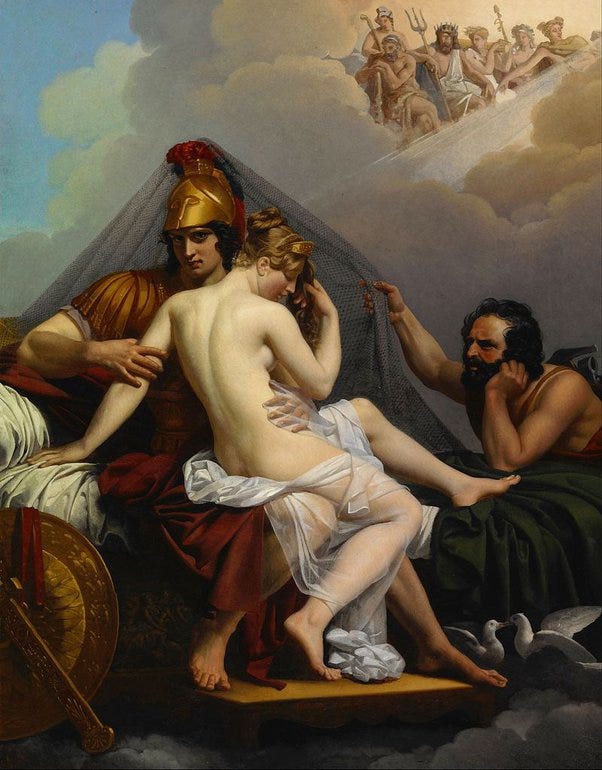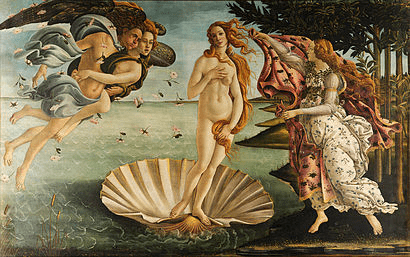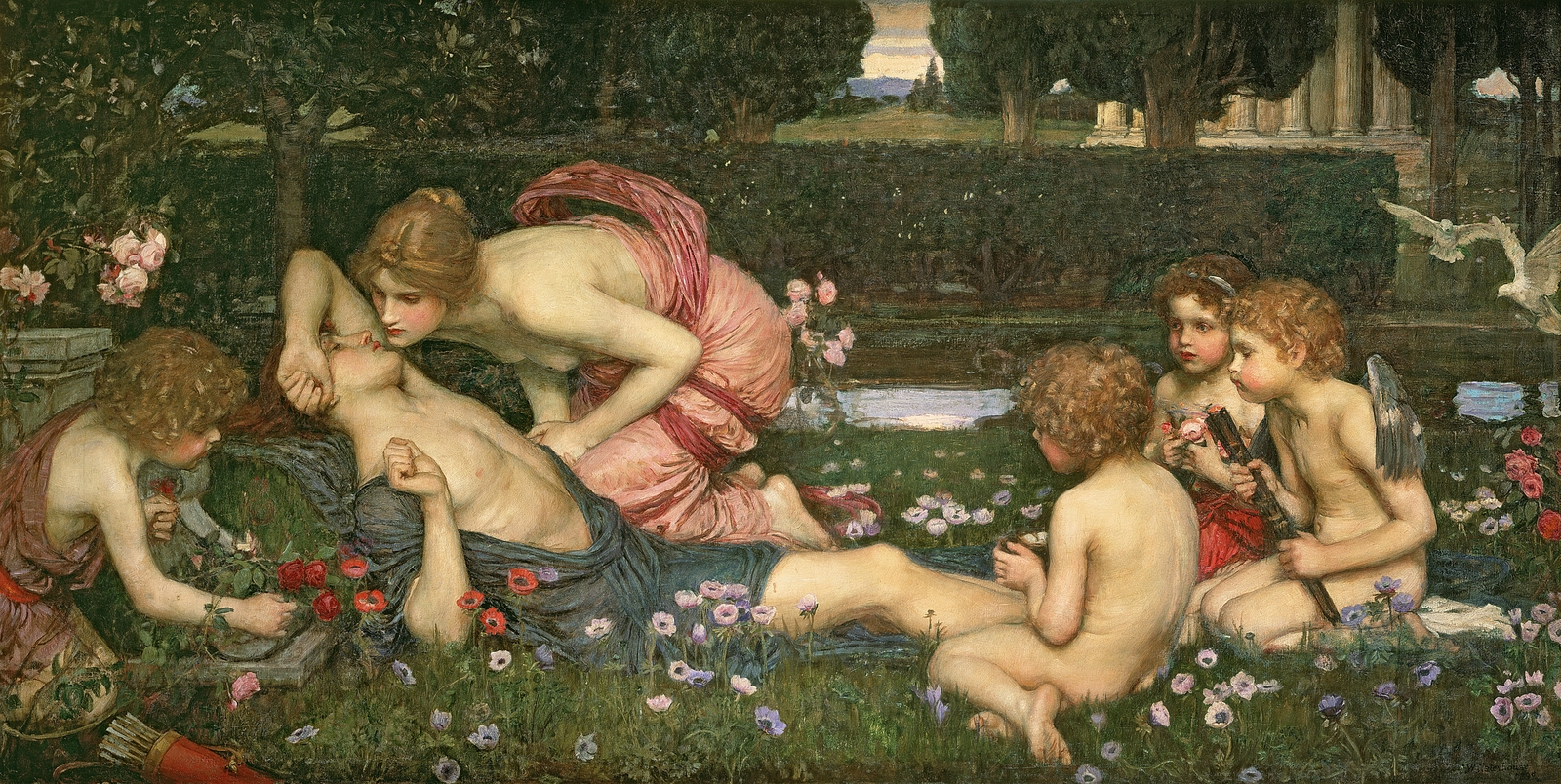The Birth of Venus
Aphrodite: The Alchemical Goddess of Love and Beauty

Aphrodite’s Task’s for Daughter in law Psyche
Are You Good Enough for Your Mother-in-Law?

Psyche was a pregnant, mortal woman, who wanted to be reunited with her husband Eros, Aphrodite’s son. To test her, to decide if Psyche is worthy of her son, Aphrodite gave Psyche what seemed like four impossible tasks to complete. First she lead Psyche to a giant pile of seeds jumbled together, and told her she must sort them. An army of ants came to Psyche’s aid. So the first lesson is that a woman must make a decision, and “sort the seeds”, to see what is the most important situation to be attended to when we have conflicted feelings, and what less urgent matters can wait for attention later. It is imperative not to act on something until clarity has been achieved.
Next Aphrodite ordered Psyche to acquire a golden fleece from terrible, horned rams. Again, this seemed impossible. A green reed advised Psyche to wait until the sun went down, because the rams would quiet down and go to sleep. Once this happened, Psyche would be able to safely pick the golden fleece from the brambles on which it hung. The golden fleece is a symbol of power, which a woman needs to acquire so that the world does not destroy her. It is important to be able to learn to use power wisely, by waiting, observing, and acquiring it slowly and indirectly. Remember that Aphrodite herself often used her powers in a destructive way that hurt others. Power in itself is neutral.
Psyche’s Tasks from Aphrodite, Greek Goddess of Love and Beauty
The third task was for Psyche to fill a crystal flask from a stream that ran from up in the clouds to under the earth. It cascaded from the summit of the highest cliff, and then ran to the lowest depth of the Underworld, before it was once more drawn up through the earth. The stream was a metaphor for the circle of life. An eagle came to Psyche, because he had the ability to see the land from a large perspective, then swooped down to grasp whatever was necessary. Sometimes it is difficult for a woman to take the long view or see the “whole picture”, when she has so many people and problems vying for her attention. Women must learn to get some emotional distance from problems, or else sometimes they cannot see the forest for the trees. They must learn to figure out what is most significant and important, and only then decide how to act upon the issues.
The fourth task sent Psyche to the Underworld with a small, empty box that needed to be filled with beauty ointments from Persephone. Psyche was frightened, as she felt this task is the one that meant death for her. This is the hero’s test, where the most determination and courage are needed. Aphrodite knew she was making it especially hard for Psyche. She told Psyche that pathetic and poor people would ask her for help as she was trying to complete this task. But she would have to ignore them, to “harden her heart” to compassion, and continue onward. If she failed, Psyche would have to stay forever in the Underworld.
To say “no” is a particularly hard task for women, as they are used to being receptive to others. Many women, including this writer, allow themselves to be imposed upon and diverted from accomplishing whatever goal is important to them at the time. Even if the person who “needs” help only wants some company or comfort, a woman must say no if it takes her away from doing something that is necessary and important to herself and her own well-being. Psyche must exercise choice every time she says “no.” She completed this task too, and evolved. So although it seems that these tasks are just another case of Aphrodite being cruel, she actually taught Psyche valuable lessons, ones that all women can use to simplify their lives and achieve their goals.
Aphrodite
Aphrodite’s Love of Beauty and Sexuality
The Aphrodite archetype in mythology affects women’s enjoyment of love, beauty, sexuality and sensuality. They feel a desire to fulfill both creative and procreative functions while feeling this powerful pull. Aphrodite has children because of her desire for the man, and her desire for the romantic experience. She is a great force for change. When an artist or writer stays up all night for weeks to work on a painting or write a book, the creative result is still a union that gives birth, but to a creative work of some kind.
Aphrodite came out of the sea in all her naked, golden haired beauty. But she can also be part of a plain looking woman, who is charismatic and attracts others with her warmth and charm. If she works, she is best suited to a career in the arts, such as music, dancing or drama. She is most concerned with being happy in work, not in how much money she can earn. Unless Aphrodite has strong Hera instincts, she will not want to be chained to a marriage.
She does like children though, and they respond to her well. She makes children feel special, and can really get into the spirit of play and make believe. An Aphrodite woman often has many female friends who enjoy her spontaneity and attractiveness. Many of them share the same qualities. Other women that surround her seem to act more as her attendants, because they either enjoy her company or like to live vicariously through her romantic dramas. She will have no friends of the “Hera” variety, as she will be mistrusted by a woman who is afraid that her man will be stolen away from her. An Aphrodite has a long history of “stealing” her supposed friend’s boyfriends and husbands, ruining relationships, and then casting the men aside once the damage is done.
The middle aged years will be hard for Aphrodite if her attractiveness has been her biggest source of security. She will feel anxious that her beauty is fading. But she may also be tired of her former lifestyle and get an urge to settle down. If she has been engaged in creative work, her enthusiasm and abilities to find inspiration may grow and she may develop even more skills with which to express herself. As she grows old, she can keep her capacity to see beauty in whatever or whomever she focuses on.
This will enable her to grow older with grace and vitality. She will retain a youthful attitude towards life, and staying young at heart will continue to win her new friends of all ages. After all, Aphrodite women are extroverts with a lust for life and a passionate personality, and this does not have to fade with age. If she developed her skills and became educated, Artemis and Athena traits will become more prominent in her now, as she finds new interests to occupy her and her life centers less around men. If she marries and has a child, Hera and Demeter influences will have given her more family stability and maturity. If she cultivates some of Persephone’s introversion, she can have a rich fantasy life instead of being a heart breaker and home wrecker.
Our Inner Aphrodite
As women we all need to develop capabilities and strengths as our courage and determination are tested. Despite all the problems we encounter, and trials we endure, each one proves to us that we are much more capable and stronger than we ever believed. There is an old saying, “Whatever doesn’t kill you makes you stronger.” All people value love and will risk almost anything for it. We must be sure we wisely choose whom we love, and then we will be winners, because our relationships will have value, and we in turn will be valued and respected in them. So although we may not wish to emulate all of Aphrodite’s traits, by learning her story we can see parts of our own selves, and learn something unique not only from her, but from each of the goddesses in Greek mythology. Pay attention to the inner goddess in yourself!
Aphrodite stands alone in a class of her own, possessing a magical allure and the extraordinary ability to transform individuals. As the alchemical goddess of love, she wields unique powers that bend both gods and mortals to her will. Through enchanting spells, she orchestrates unions among mortals and deities, inspiring poetry, declarations of love, and even conceiving new life. Notably, she turned a lifeless statue into a living woman for Pygmalion, showcasing her unparalleled creative use of the power of love.
While sharing some traits with other Greek goddesses, Aphrodite defies categorization, standing apart from virgin goddesses like Artemis, Athena, and Hestia. Her insatiable passion sets her apart, as she pursues her desires without constraints, valuing independence and eschewing permanent commitments.
Aphrodite’s love for relationships is undeniable, yet she avoids long-term plans, preferring to consummate connections and ignite new life. This archetype finds expression through various means, be it physical intimacy, artistic endeavors, or creative projects. Her unwavering focus and determination make it impossible to sway her from a chosen goal once decided upon, drawing parallels with the introverted virgin goddess, Hestia.
Irresistible to Men:
Aphrodite’s touch bestows irresistible beauty, creating a magnetic attraction commonly referred to as “chemistry” between individuals. This allure transcends the physical, manifesting as a powerful psychological and spiritual urge. Whether leading to intimate relationships or fostering growth in the realms of psychology, spirituality, or emotion, Aphrodite’s influence is far-reaching and not limited to the romantic sphere.
Aphrodite’s attention is intensely focused, her receptivity and charm making others feel special in her presence. However, her seemingly affectionate nature can be misleading, as she treats everyone with equal fascination, often leading to misinterpretations of her intentions.
Exploits with Mortals:
Aphrodite’s romantic entanglements extend to both gods and mortals. Linked romantically with Ares, the god of War, their union represents the harmony of two uncontrollable passions. From their affair, Harmonia, Phobos, and Deimos were born. Additionally, her union with Hermes resulted in Hermaphroditus, a god embodying both bisexuality and androgyny.
The goddess’s involvement with mortals includes seducing Anchises, leading to the birth of Aeneas, and her attraction to Adonis, the youthful hunter whose tragic demise symbolizes the cycle of fertility. Aphrodite’s influence also extends to mortal women, as seen in the stories of Myrrha and Phaedra, revealing the complexity of her character and the consequences of her actions.
Cruelty and Mean Streak:
- While celebrated for her beauty, Aphrodite’s darker side emerges in tales of cruelty and vengeance. Phaedra, victimized by Aphrodite’s manipulations, succumbs to a tragic fate. The goddess’s involvement in mortals’ lives often leads to devastating outcomes, challenging the perception of her beauty as merely skin deep. In our modern context, Aphrodite might be subjected to the harsh scrutiny of slut-shaming, underscoring the complexities of her character beyond surface charm.





